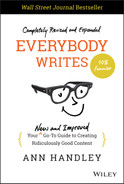30
Set a Goal Based on Word Count (Not Time)
Y ou can't improve what you don't measure is the old management maxim highlighting data's key role in any operation.
It's sometimes attributed to Peter Drucker and sometimes to statistician William Edwards Deming. (Neither actually said it—but the Internet still wants to fight about it.)
Setting metrics and goals is just as useful for writing as it is for a modern-day Peter or William or whoever.
Clocking a daily metric lets you track and celebrate and feel proud of your progress.
Think of setting a daily writing goal as setting a step goal in your Fitbit. Over time, you'll become a fitter, stronger writer.
And similar to Fitbit, measure your output—words—rather than time. Said another way, but in bold:
Track the number of words you write. Not how long it took to write them.
It doesn't do much for you to stare at a blank page and blinking cursor for 30 minutes. It's depressing. It's useless.
It's far better to keep your hands moving. Keep writing. Keep going. Do not stop your fingers from choreographing their own improvised tap dance as they move across a keyboard or across a page.
Your exact word goal is your call; you set your own benchmark.
My own daily goal is 999 words. (I talked about why 999 in Chapter 8.)
Not too long ago, author and photographer Dane Sanders wrote two books in the same year for Random House. Both books became best sellers.
Dane had always made writing a daily habit. But the grind of churning out two books in 12 months made writing feel like a death march, he said. He quit for a while.
Then he started to miss it. To reignite his routine, he began clocking a daily word goal. He started with a low word count—a small, fun-sized goal, like a miniature candy bar from a Halloween bucket. Dane wanted it to feel easily doable—like he could manage it in one sitting.
“If you're just beginning your writing routine, make 50 words a win—that's about a tweet's worth of content,” Dane says.
Over the next few weeks, up your production to 250 words or 500 words, he suggests, “but keep working until you can get a minimum of 750 words completed in every sitting without too much pain.”
A word count of 750 totals about two pages of text. In writing circles, it's a magic number traced back to Julia Cameron's idea of writing daily Morning Pages from her book The Artist's Way.
Dane now maintains a pace of 1,000 words daily. “I don't ever feel good about a day unless I have a minimum of at least that many words,” Dane says. “Every time I do that I give myself credit … and all is right in my writing world.”
Over the course of a year, Dane has produced roughly 1,500 pages. “I do that two years in a row…and I have a greater word count than Tolstoy's War and Peace.”
Which is, Dane said, “not bad.”
